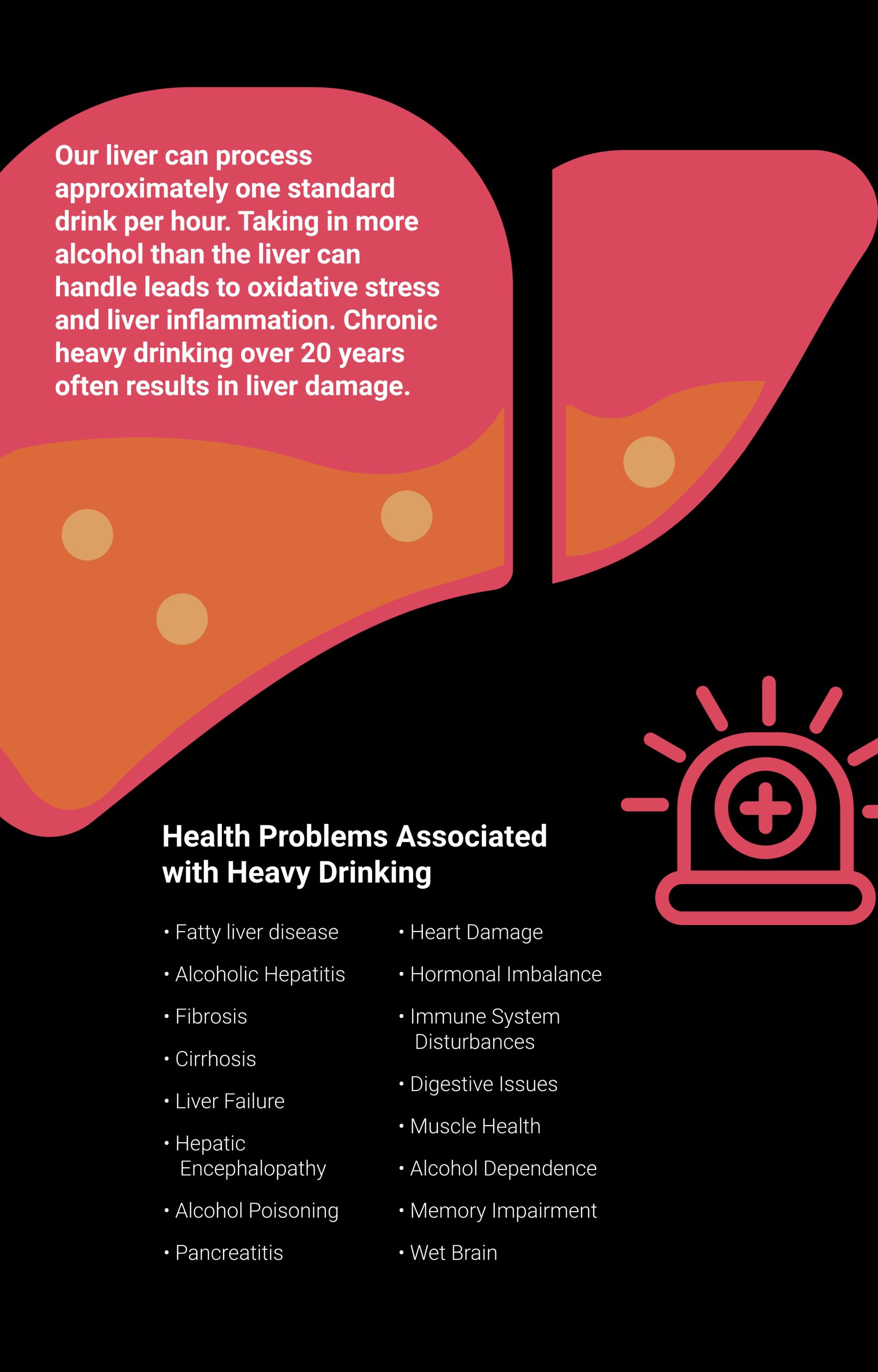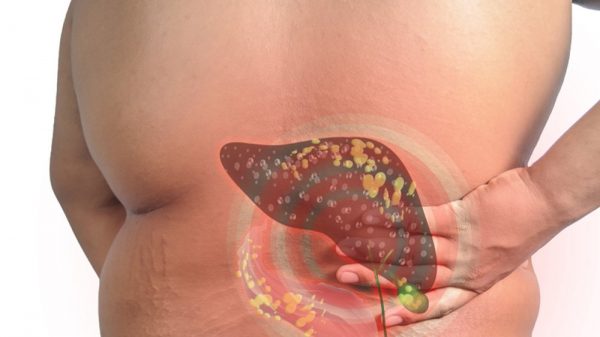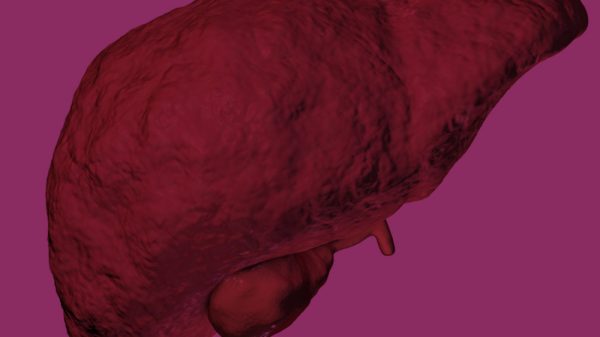Drinking alcohol is such a common part of American culture. From college students enjoying a night out to colleagues meeting for happy hour, you can find all kinds of people enjoying a drink. However, when consumed in excess, alcohol can have serious consequences for health and well-being.
Even more detrimental to your health is heavy drinking over a prolonged period of time. What do 20 years of heavy drinking do to your mental and physical health? Read on to find out.
How Do 20 Years of Heavy Drinking Affect the Liver?
Liver diseases are some of the most common diseases among chronic heavy drinkers. The liver is particularly vulnerable to alcohol-induced damage. When we drink alcohol, it is absorbed through the stomach and sent to the liver for detoxification. The liver contains enzymes like cytochrome P450 that are responsible for breaking down toxins like ethanol into more manageable components that the body can safely excrete.
While the liver is a tough organ that is designed to process toxins, it is not invincible. The liver can process approximately one standard drink per hour, before ethanol gets backlogged in the bloodstream, waiting to be processed by the liver. Taking in more alcohol than the liver can handle leads to oxidative stress and inflammation in the liver. Chronic heavy drinking over 20 years often results in liver damage.
Fatty Liver Disease
Fatty liver disease is the earliest stage of liver disease as a result of chronic drinking. Also referred to as hepatic steatosis, this condition is characterized by the buildup of fat tissue in the liver. Fat particles infiltrate liver cells, which are also called hepatocytes. Continuous oxidative stress that alcohol causes can lead to malfunctioning metabolic processes and the accumulation of fat in the liver. Fatty liver disease often has no symptoms and can often be effectively reversed by stopping alcohol consumption, allowing the liver to heal.
As the condition progresses, you may start to exhibit symptoms. Here are a few signs and symptoms of fatty liver disease:
- Fatigue
- Feeling weak
- Unexplained weight loss
- Pain in the upper right quadrant of your abdomen
Alcoholic Hepatitis
Alcoholic hepatitis represents the progression of fatty liver disease to the next stage. Along with fatty accumulation in the liver, liver tissue also becomes inflamed. At this stage of liver disease, symptoms may become more pronounced.
Fibrosis
Untreated alcoholic steatohepatitis causes continuous inflammation and damage in the liver until fibrosis begins. Fibrosis is a process in which collagen and scar tissue begin to form in the liver. In particular, scar tissue begins to develop in the extracellular matrix surrounding hepatocytes.
Cirrhosis
Cirrhosis develops after continued liver fibrosis and is characterized by hardened, scarred liver tissue. The areas of liver tissue that are scarred and hardened have lost function and can no longer help detoxify substances or carry out essential metabolic functions. Cirrhosis is a chronic disease that is difficult or impossible to reverse.
Liver cirrhosis is often accompanied by more serious symptoms, including:
- Ascites, or swelling of the abdomen
- Jaundice, or yellowing of the skin
- Muscle wasting
- Itching
- Extreme fatigue
- Severe bruising
Liver Failure
End-stage liver failure occurs after many years of alcohol abuse and the progression of fatty liver disease to liver cirrhosis. Liver failure cannot be reversed and requires liver transplantation.
Hepatic Encephalopathy
Hepatic encephalopathy is a consequence of severely impaired liver function as a result of alcohol abuse. When alcohol-induced liver damage has reached late-stage cirrhosis, the liver is no longer able to carry out its normal functions. As a result, toxins that would normally be processed and filtered remain in the bloodstream, where they can travel to other areas of the body, including the brain. Hepatic encephalopathy causes serious symptoms like anxiety, confusion, and seizures.
Other Health Problems Associated with Heavy Drinking
Liver problems aren’t the only health issue linked to heavy drinking. After 20 years of heavy drinking, you may experience a variety of health issues affecting both your physical and mental well-being.
Alcohol Poisoning
If you have been drinking heavily for 20 years, it’s very likely that you have experienced alcohol poisoning. Excessive alcohol use and binge drinking are direct causes of alcohol poisoning, which means that your blood alcohol concentration (BAC) has reached dangerously high levels.
Your blood alcohol concentration (BAC) is the amount of alcohol in your bloodstream at a given time. For example, a BAC of 0.02 indicates that per 100 milliliters of blood, there are 0.02 grams of alcohol. After one drink, an individual will have a BAC between 0.02 and 0.03.
However, in excess, alcohol can cause serious and life-threatening symptoms. At a BAC As your BAC rises above 0.05, you will start noticing increased impairment and sedative effects of alcohol consumption. A BAC above 0.25 likely leads to alcohol poisoning.
Alcohol is classified as a depressant. This means that the active ingredient in alcoholic drinks, ethanol, suppresses central nervous system activity. The central nervous system can be thought of as the control center of the body, responsible for firing electrical signals When we drink alcohol, neurons don’t communicate as effectively or efficiently. As a result, messages travel much more slowly between the brain, nervous system, and the rest of the body. Alcohol poisoning is a medical emergency and can result in death. If you suspect that someone has consumed too much alcohol, it’s important to contact emergency medical services.
Pancreatitis
Pancreatitis is a condition that often develops as a result of excessive alcohol consumption. (1) Excessive drinking over time can cause inflammation and blockages in the ducts of the pancreas, leading to pancreatitis. (1) Symptoms may include nausea, fever, difficulty breathing, and intense pain in the abdominal area.
Heart Damage
Alcohol has significant impacts on the cardiovascular system. Because alcohol is a depressant, drinking excess alcohol can cause the heart to beat more slowly. Alcohol also causes the blood vessels to dilate. Combined with alcohol’s diuretic properties, blood vessel dilation can cause blood to accumulate in the legs.
Drinking too much alcohol can also damage the heart muscle and interfere with the heart’s normal electrical impulses, leading to heart arrhythmias that may be dangerous. Over time, heavy drinking leads to an increased risk of developing heart disease and high blood pressure.
It’s important to note that in extremely high doses, alcohol can suppress the central nervous system to the point where you stop breathing and your heart stops beating.
Hormonal Imbalance
Heavy drinking over 20 years can wreak havoc on hormonal health. Drinking excess alcohol can damage the endocrine system, which can have negative consequences for the body’s homeostasis. A review published in Endocrinology & Metabolism Clinics of North America reveals the impact of alcohol use on the endocrine system. (2) The investigation shows that hormonal disturbances caused by alcohol consumption may contribute to reproductive dysfunction, thyroid imbalances, and disruptions in the stress response. (2)
Immune System Disturbances
When consumed in excess, alcohol is known to be an immune system suppressant. Normally, the immune system picks up on the presence of foreign invaders like viruses, bacteria, and other pathogens. When the immune system is functioning normally, it is able to fight off viruses and bacteria to prevent infection. In the presence of alcohol, the body is unable to efficiently fight off infection. In the days following a drinking episode, you may notice that you are more prone to feeling run down or getting sick.
However, when immune system activity is suppressed, the body is more vulnerable to infection. Chronic excess drinking may even cause inflammation that increases the risk of autoimmune disorders.
Digestive Issues
Alcohol can also have a negative impact on the digestive system. First, drinking large amounts of alcohol can cause inflammation within the digestive tract. This can cause uncomfortable symptoms like acid reflux, burning, and stomach pain. Alcohol also changes the composition of the microbiome, potentially wiping out healthy strains of bacteria. The result of an imbalanced microbiome is increased inflammation in the body, which can also be a risk factor for developing stomach ulcers. In the short-term, excessive alcohol consumption can cause vomiting, which can irritate the esophagus.
Moreover, chronic alcohol consumption can inhibit the normal absorption of nutrients like carbohydrates, protein, fat, and B vitamins. Alcohol causes inflammation in the small intestine that prevents the normal absorption of both macronutrients and micronutrients. Severe malnutrition from alcohol consumption can cause Wernicke Korsakoff syndrome. or wet brain syndrome.
Muscle Health
Having lean muscle mass is critical for supporting a healthy metabolism as well as overall strength and wellbeing. However, excess alcohol consumption can impede muscle growth and maintenance. In a randomized study published in PLoS One, researchers evaluated the impact of alcohol consumption on muscle synthesis in 8 males. (3) Results revealed that alcohol consumption was linked to a lower rate of myofibrillar protein synthesis. (3)
Alcohol-induced liver cirrhosis is also linked to unhealthy weight loss and muscle wasting. When the liver is damaged, the body has a difficult time carrying out metabolic processes for storing and utilizing energy.
Muscle wasting can contribute to a sluggish metabolism, higher risk of injury, and lower quality of life.
Alcohol Dependence
Constantly drinking can lead to alcohol dependence, which means that your body relies on alcohol to function. When you stop drinking, you start to experience unpleasant withdrawal symptoms like shaking, vomiting, fast heart rate, and sweating.
Memory Impairment
You may know that acute binge drinking can lead to memory loss during intoxication. Excess alcohol consumption over time can be connected to memory impairment. Drinking excess alcohol slows down cognitive functioning and inhibits neurotransmitter activity. Moreover, oxidative stress from alcohol consumption leads to the buildup of waste products in the brain. When consumed in large amounts, alcohol can deprive the brain of oxygen, leading to brain cell death.
Wet Brain
Severe malnutrition and depletion of thiamine (vitamin B1) result from excessive alcohol consumption over a long period of time. This can cause Wernicke Korsakoff syndrome, or wet brain syndrome. Symptoms may include memory loss, irritability, loss of vision, and loss of coordination.
Steps You Can Take to Heal
If you have been struggling with heavy drinking for 20 years, it’s important to understand that it’s not too late to quit. There are steps you can take to heal and recover from alcohol use disorder, both mentally and physically.
Detox
If you are physically dependent on alcohol, you will need to detox and slowly reduce your reliance on alcohol. Quitting cold turkey can be life-threatening. In order to detox safely, it must be a gradual process. It’s best to talk to a health care provider about the best way to detox from alcohol.
Physical Healing and Good Nutrition
Even after you’ve gone through the detox process to break the physical addiction to alcohol and substances, your body still needs to heal from the damage that alcohol has inflicted on your organ systems. In a nutshell, alcohol causes oxidative damage and inflammation in body tissues, while simultaneously inhibiting the normal absorption of critical nutrients that the body needs.
The good news is that the body can heal from alcohol-induced damage after you are sober. For example, if you have alcoholic fatty liver disease, eliminating alcohol intake and eating a balanced diet that includes antioxidants from fruits and veggies, essential amino acids from high-quality protein, and fiber from whole grains can support liver health.
Fruits and Veggies
Fruits and vegetables are packed with antioxidants, vitamins, and minerals that the body needs to repair from alcohol and drug use. Antioxidants support the immune system in repairing damage sustained from chronic drug or alcohol abuse. Reach for fruits and veggies like broccoli, spinach, sweet potatoes, berries, apples, and oranges.
High-Quality Protein
High-quality protein offers optimal ratios of essential amino acids, which the body needs to build muscle tissue. Excessive drug and alcohol use often results in serious weight loss and muscle wasting. As part of the recovery process, eating plenty of high-quality protein can help you regain healthy weight and muscle mass.
Moreover, getting balanced ratios of essential amino acids can support liver health and fight fatty liver disease. In an article published in Nutrients, researchers conducted a pilot study examining the effect of essential amino acid supplementation on individuals with alcohol use disorder. (4) Results revealed that in comparison to the control, the group taking the substance had significantly lower liver fat levels. (4)
You can get optimal ratios of essential amino acids from foods like lean meats, eggs, and low-fat dairy. Eating a combination of veggie protein also offers essential amino acids. For example, reach for foods like nuts, seeds, beans, soy products, and whole grains throughout the day. Alternatively, a high-quality supplement is an excellent option.
Joining a Support Group
Alcoholics Anonymous (AA) is a nation-wide program that connects recovering substance abusers through in-person meetings and online platforms. AA is a support group that provides guidance for living sober and is structured around a 12-steps that many recovering addicts find helpful.
Consider an Inpatient Treatment Program
Addiction treatment and addiction recovery is tough when you’re doing it alone. Entering a treatment program can provide structure for the initial part of your recovery journey. An inpatient treatment facility can be particularly helpful by removing you from your environment and creating distance between you and triggers. An outpatient treatment program can also help provide structure by holding you accountable to appointments with physicians and mental health specialists.
Determine the Psychological Factors Influencing Alcohol Use
Many times, psychological factors underlie the physical urge to drink. These factors may include an undiagnosed mental illness, trauma, or other forms of psychological pain. In many cases, using alcohol and drugs is a self-medication technique to manage the underlying psychological issue. Determining the psychological factors driving your desire to drink will be essential for fighting cravings and maintaining sobriety.
Learning New Skills
With drinking no longer a part of your daily routine, you will likely have a little more time on your hands to devote to new activities and hobbies. Staying busy and trying new things is crucial for keeping your mind occupied and decreasing the risk of relapsing. A few examples of new activities include rock climbing, playing sports, and cooking.
Stress Management Strategies
Stress is a common trigger for many recovering addicts. Self-medicating anxiety with alcohol may have even been a large reason for drinking in the first place. Either way, managing stress after you become sober is key to maintaining your sobriety. Activities like yoga, meditation, and deep breathing are critical for warding off anxious thoughts and helping you recenter.
Resources and Information
If you are worried that you or a loved one is struggling with excessive alcohol use, it’s important to have resources on hand for support.
- Your doctor: Your primary care physician can assess your symptoms and provide referrals to mental health services, behavioral health support, and treatment options.
- SAMHSA: The Substance Abuse and Mental Health Services Administration is part of the U.S. Department of Health and Human Services and provides support for and resources through the Center for Substance Abuse Prevention.
- NIDA: The National Institute on Drug Abuse provides information, research, and training.
- NIAAA: The National Institute on Alcohol Abuse and Alcoholism provides helpful information regarding alcoholism and resources for finding treatment for alcohol addiction.
- CDC: The Centers for Disease Control and Prevention provide helpful information and resources regarding alcohol use and public health.
Key Takeaways: What Do 20 Years of Heavy Drinking Do to Your Health?
Alcohol is essentially a toxin, and when consumed in excess over a long period of time, can have serious negative impacts on your health and well-being. Some of the common health conditions resulting from 20 years of heavy drinking include fatty liver disease, liver cirrhosis, brain damage, and heart disease. All of that being said; it’s never too late to stop drinking and seek recovery. Safely detoxing, making changes to your diet and lifestyle, and utilizing support services are vital to facilitating healing from alcohol dependence.

References:
(1) https://www.ncbi.nlm.nih.gov/books/NBK537191/
(2) https://www.ncbi.nlm.nih.gov/pmc/articles/PMC3767933/























